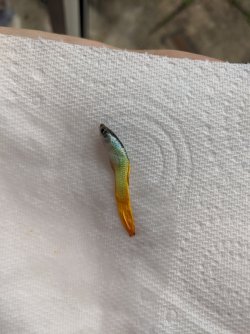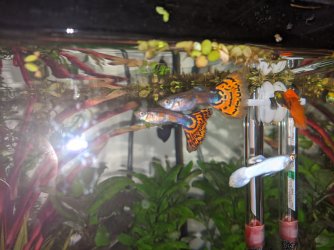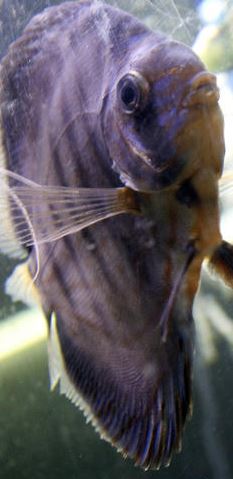Hi there,
I've got a 55L tank Ammonia 0ppm, Nitrite 0ppm, nitrate 5ppm with 6 male guppies (now 5) and 6 pygmy cories.
I added one guppy and the 6 cories around 3 weeks ago. The guppy was thin when I got it but I just thought it was a different body shape.
After a while I saw he was flashing and now the other fish in the tank have started flashing too. Today I noticed the new guppy was very gaunt, struggling to swim and mostly pointing face up and hanging down. I decided to euthanise because he was sick for a while and I didn't know what was wrong. He also had fin rot. He had no other symptoms like ich or stringy poop.
The other guppies in the tank are flashing, but they are eating well, no physical injuries, no fin rot, nothing wrong with their poo.
I've treated them with a formaldehyde external parasite treatment which made no difference. Then big water change and currently treating with a silver anti bac treatment, still no change in flashing. I'm at a loss and desperate for some answers. Feeling extremely guilty that I didn't QT (no facility for it) and stressed at what I've introduced here.
I've attached a picture of the euthanised guppy in case it helps.
I've got a 55L tank Ammonia 0ppm, Nitrite 0ppm, nitrate 5ppm with 6 male guppies (now 5) and 6 pygmy cories.
I added one guppy and the 6 cories around 3 weeks ago. The guppy was thin when I got it but I just thought it was a different body shape.
After a while I saw he was flashing and now the other fish in the tank have started flashing too. Today I noticed the new guppy was very gaunt, struggling to swim and mostly pointing face up and hanging down. I decided to euthanise because he was sick for a while and I didn't know what was wrong. He also had fin rot. He had no other symptoms like ich or stringy poop.
The other guppies in the tank are flashing, but they are eating well, no physical injuries, no fin rot, nothing wrong with their poo.
I've treated them with a formaldehyde external parasite treatment which made no difference. Then big water change and currently treating with a silver anti bac treatment, still no change in flashing. I'm at a loss and desperate for some answers. Feeling extremely guilty that I didn't QT (no facility for it) and stressed at what I've introduced here.
I've attached a picture of the euthanised guppy in case it helps.












